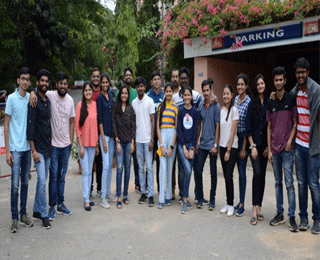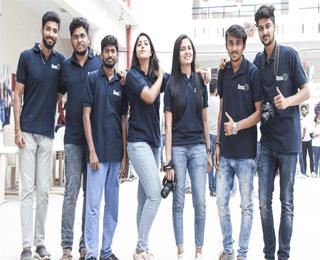ICFAI Business School, Bangalore: Leadership through Innovation & Adaptation

Prof. G V Muralidhara, Director & Campus Head
ICFAI Business School (IBS) was established in 1995 simultaneously in seven centres across India, and has come a long way since then. IBS Bangalore too has been in existence since 1995, and is housed in a spacious 22-acre campus near Kengeri, with all requisite infrastructure and facilities. IBS Bangalore is now an off-campus center of ICFAI Foundation for Higher Education (IFHE), a deemed-to-be university headquartered at Hyderabad. IBS Bangalore offers a full-time two year MBA program and also a full-time five year integrated BBA-MBA program.
The mission of ICFAI Business School is to develop ethically-grounded professional managers who can add value to organizations and communities, in a dynamic environment. The School promotes high-quality learning experience, in an adaptive environment, with a focus on relevance, rigor and research.
The unique feature of IBS is that it has strong systems and processes in place, which enable it to instil its students with the requisite skills and capabilities in an effective manner. At the same time, IBS is flexible and adaptable to situations. It is innovative, and keeps on making changes and improvements in keeping with the times.
New courses and disciplines are added to the curriculum quite regularly, in consultation with industry. We were one of the early ones to include Analytics as a full-fledged discipline, with a bouquet of electives; and this was about a decade ago. Likewise, digital marketing has been a popular subject and a source of interesting careers for many of our students. In recent times, we have added contemporary electives such as FinTech.

In addition, free certification courses are conducted on various new age topics such as Artificial Intelligence & Machine Learning, Data Visualization with Power BI, and Design Thinking, to name but a few. Students are also encouraged to take up certification courses on their own, and the institute subsidizes part of the cost. All these make the students ready to take on available job opportunities in modern-day disciplines, which are coming up in a big way.

The institute also encourages and facilitates in developing interest towards learning and acquiring skills among students by providing certificates, prizes, arranging competitions and `hackathons', offering assistantships, etc., so that this expression of interest becomes natural.
The curriculum followed by IBS is far from theoretical. Firstly, the curriculum is designed with active participation by industry, so that it meets with practical requirements. What also makes a significant difference thereafter is the way the courses are delivered and evaluated. Student-centric learning is used as the prime driver, rather than faculty-centred teaching. Faculty's role is seen as that of a facilitator. Students go through an experiential learning process through a variety of routes such as case studies, interactive videos, practice-oriented assignments and a host of self-learning materials created by IBS faculty, supplemented with industry visits and projects given by industry.

It has been nearly two years since the COVID pandemic struck the entire world, bringing with it a new wave of challenges. ICFAI Business School responded to the challenges with a positive outlook and quickly adapted itself to the new situation.
None of our activities were delayed or affected by the pandemic. We quickly put in place the necessary facilities - smart boards, multiple cameras in class rooms for conducting hybrid classes, learning management & student information systems, synchronous & asynchronous learning materials, etc. We also trained our people (both faculty members and academics staff), and went ahead with the student selection process, summer internship program, orientation program for the new batch of students, followed by regular classes, continual evaluations, examinations, co-curricular and extra-curricular activities, exactly as per regular schedule. Campus placements too happened on schedule and almost 100 per cent of the students were placed, as during the normal years. The only change was that most activities were being conducted online, instead of in the physical mode.

Recruiters come back to us year after year as they find our students industry ready ' both by way of subject knowledge, and also in their attitude and soft skills. We have an extensive soft skills curriculum spread across three semesters. Further, a 14-week summer internship between the first and second years (with 18 credits) and with active involvement and guidance by a company guide as well as a faculty guide, makes this a good substitute for practical work experience, especially for freshers. Further, short duration live projects are also encouraged.
"One may not be having a particular skill at the time of selection; but if the student shows the intent and passion to pick up that talent, companies do not hesitate to hire that student"
In recent times, recruiters are focusing more on the skill sets of the students than on the marks/grades. Though marks/grades are sometimes used as basic eligibility criteria, the skill sets that the students can bring to the table, become the final selection criteria.

The recruiters also look for the passion for learning in the candidates. One may not be having a particular skill at the time of selection; but if the student shows the intent and passion to pick up that talent, companies do not hesitate to hire that student.
Recruiters also look for practical application of knowledge to management situations. Students' exposure during the summer internship program as well as during live (short term) projects is also being taken more seriously.
"The mission of Icfai business school is to develop ethically-grounded professional managers who can add value to organizations and communities, in a dynamic environment. The school promotes high-quality learning experience, in an adaptive environment, with a focus on relevance, rigor and research"
Many of our students also move on to be successful entrepreneurs. Some start afresh, while others bring in new insights and grow their family businesses. We have an elective on Entrepreneurship Management and also an incubation cell that guides our alumni through this process.
We have a large alumni network (over 58,000 alumni across IBS campuses) and a strong connect with the industry. Faculty members update themselves about latest developments in industry through regular interactions with industry professionals, both formally and informally. Experts from the industry also address and guide our students as guest faculty, as professional mentors and through engagement in various activities of the Institute.
The roadmap ahead is that IBS will continue to follow a robust system and process, and at the same time be innovative and keep adapting. This will enable it to produce high quality management graduates, who can add value to the organizations that they join and also build a good career for themselves.
The mission of ICFAI Business School is to develop ethically-grounded professional managers who can add value to organizations and communities, in a dynamic environment. The School promotes high-quality learning experience, in an adaptive environment, with a focus on relevance, rigor and research.
The unique feature of IBS is that it has strong systems and processes in place, which enable it to instil its students with the requisite skills and capabilities in an effective manner. At the same time, IBS is flexible and adaptable to situations. It is innovative, and keeps on making changes and improvements in keeping with the times.
New courses and disciplines are added to the curriculum quite regularly, in consultation with industry. We were one of the early ones to include Analytics as a full-fledged discipline, with a bouquet of electives; and this was about a decade ago. Likewise, digital marketing has been a popular subject and a source of interesting careers for many of our students. In recent times, we have added contemporary electives such as FinTech.

In addition, free certification courses are conducted on various new age topics such as Artificial Intelligence & Machine Learning, Data Visualization with Power BI, and Design Thinking, to name but a few. Students are also encouraged to take up certification courses on their own, and the institute subsidizes part of the cost. All these make the students ready to take on available job opportunities in modern-day disciplines, which are coming up in a big way.

The institute also encourages and facilitates in developing interest towards learning and acquiring skills among students by providing certificates, prizes, arranging competitions and `hackathons', offering assistantships, etc., so that this expression of interest becomes natural.
The curriculum followed by IBS is far from theoretical. Firstly, the curriculum is designed with active participation by industry, so that it meets with practical requirements. What also makes a significant difference thereafter is the way the courses are delivered and evaluated. Student-centric learning is used as the prime driver, rather than faculty-centred teaching. Faculty's role is seen as that of a facilitator. Students go through an experiential learning process through a variety of routes such as case studies, interactive videos, practice-oriented assignments and a host of self-learning materials created by IBS faculty, supplemented with industry visits and projects given by industry.

It has been nearly two years since the COVID pandemic struck the entire world, bringing with it a new wave of challenges. ICFAI Business School responded to the challenges with a positive outlook and quickly adapted itself to the new situation.
None of our activities were delayed or affected by the pandemic. We quickly put in place the necessary facilities - smart boards, multiple cameras in class rooms for conducting hybrid classes, learning management & student information systems, synchronous & asynchronous learning materials, etc. We also trained our people (both faculty members and academics staff), and went ahead with the student selection process, summer internship program, orientation program for the new batch of students, followed by regular classes, continual evaluations, examinations, co-curricular and extra-curricular activities, exactly as per regular schedule. Campus placements too happened on schedule and almost 100 per cent of the students were placed, as during the normal years. The only change was that most activities were being conducted online, instead of in the physical mode.

Recruiters come back to us year after year as they find our students industry ready ' both by way of subject knowledge, and also in their attitude and soft skills. We have an extensive soft skills curriculum spread across three semesters. Further, a 14-week summer internship between the first and second years (with 18 credits) and with active involvement and guidance by a company guide as well as a faculty guide, makes this a good substitute for practical work experience, especially for freshers. Further, short duration live projects are also encouraged.
"One may not be having a particular skill at the time of selection; but if the student shows the intent and passion to pick up that talent, companies do not hesitate to hire that student"
In recent times, recruiters are focusing more on the skill sets of the students than on the marks/grades. Though marks/grades are sometimes used as basic eligibility criteria, the skill sets that the students can bring to the table, become the final selection criteria.

The recruiters also look for the passion for learning in the candidates. One may not be having a particular skill at the time of selection; but if the student shows the intent and passion to pick up that talent, companies do not hesitate to hire that student.
Recruiters also look for practical application of knowledge to management situations. Students' exposure during the summer internship program as well as during live (short term) projects is also being taken more seriously.
"The mission of Icfai business school is to develop ethically-grounded professional managers who can add value to organizations and communities, in a dynamic environment. The school promotes high-quality learning experience, in an adaptive environment, with a focus on relevance, rigor and research"
Many of our students also move on to be successful entrepreneurs. Some start afresh, while others bring in new insights and grow their family businesses. We have an elective on Entrepreneurship Management and also an incubation cell that guides our alumni through this process.
We have a large alumni network (over 58,000 alumni across IBS campuses) and a strong connect with the industry. Faculty members update themselves about latest developments in industry through regular interactions with industry professionals, both formally and informally. Experts from the industry also address and guide our students as guest faculty, as professional mentors and through engagement in various activities of the Institute.
The roadmap ahead is that IBS will continue to follow a robust system and process, and at the same time be innovative and keep adapting. This will enable it to produce high quality management graduates, who can add value to the organizations that they join and also build a good career for themselves.

